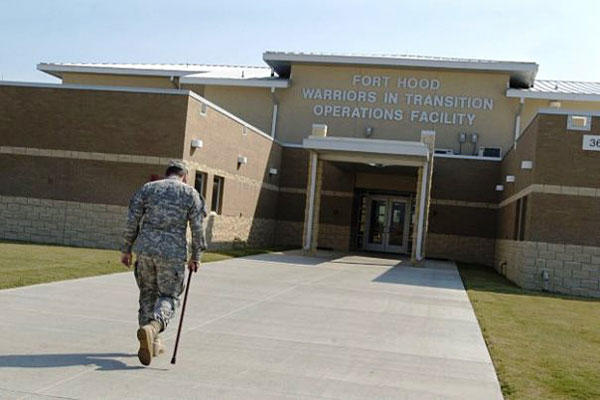The Army has begun a fact-finding investigation into allegations of recent mistreatment of wounded, ill and injured soldiers at the Warrior Transition Unit at Fort Hood, Texas.
Army officials confirmed last week that an Article 15-6 investigation under the Uniformed Code of Military Justice was underway at Fort Hood following reports that soldiers at the WTU had complained of over-medication, harassment and degrading behavior by staff. The allegations were first reported by the Dallas Morning News and local KXAS-TV (NBC5).
The latest Fort Hood reports followed a Congressional hearing last month that focused in part on allegations of mistreatment at WTUs in three Texas bases – Fort Hood, Fort Bliss and Fort Sam Houston.
Col. Chris Toner, head of the Army's Warrior Transition Command, testified that the allegations of staff treating soldiers as malingerers and other abuses were based on reports to the Army's own ombudsmen between 2009-2013.
"Certainly, those conditions existed," but the issues were addressed and Army surveys showed high levels of satisfaction from soldiers at the WTUs, Toner said.
"I'm confident that the program and policies and procedures that are in place now have the program going in the right direction," Toner said. However, there have been additional allegations of mistreatment beyond the 2009-2013 time frame.
Last year, a separate Article 15-6 investigation at Fort Carson's Embedded Behavioral Health clinic resulted in Army Surgeon General Lt. Gen. Patrica Horoho ordering a "stand down" at the Evans Army Community Hospital (EACH) at Fort Carson to focus on improving warrior care.
Horoho also ordered the Fort Carson wounded warrior staff to maintain liaison with outside advocates for troops claiming their cases were mishandled. The Army sent a copy of the investigation to Military.com.
Horoho concurred with nearly all of the findings and recommendations of Brig. Gen. John Sullivan, the investigative officer who concluded that an Army psychiatrist with the rank of major was "confrontational, demeaning and unprofessional" in sessions with a staff sergeant sent to him for evaluation of post-traumatic stress disorder (PTSD).
"I find that Maj. (name redacted) failed to treat SSG (name redacted) with dignity and respect" in a session with the Staff Sergeant last April, and that the Major acted "unprofessionally, with hostility, with a lack of empathy or in a degrading manner," Sullivan said in his report to Horoho.
The Staff Sergeant, who recorded the session and later gave the tape to Sullivan, said that the major "called me a liar" and after reviewing test results told him: "If I was that sick I should be locked up in a hospital."
"He asked why I hadn't sought treatment" for PTSD after combat tours in Iraq. "I told him that the Army teaches resilience and I was dealing with it."
At a meeting with defense reporters, Army Secretary John McHugh said he met last week with Horoho to discuss possible changes to the WTUs "and we will likely be making some announcements in the relatively near future" on the size and direction of the program.
In his discussions with Horoho on continuing problems, McHugh said "I can tell you she has taken it very, very seriously and has taken multiple steps to ensure we provide the best possible care and the highest level of dignity and respect."
"We've had had some issues but if you look across the entire WTU program, they have been relatively isolated -- but one case, one failure, for these warriors is one too many," McHugh said.
Earlier this month, Rep. Mac Thornberry, R-Tex., chairman of the House Armed Services Committee, declined comment on the latest investigation at Fort Hood but said: "It's instrumental to bring the Army's attention to some of these problems. My perception is that it's a whole lot better than it was" at the WTUs "but not as good as it needs to be."
"They were not equipped to deal with it," Thornberry said of past allegations of mistreatment at Fort Hood, Fort Bliss, and Fort Sam Houston.
Thornberry said the recurring question posed to the Army was "What's the right resource level?" He said the committee was in a "constant conversation" with the Army on funding for the WTUs.
In written responses to questions, the Army said that the Fiscal Year 2015 budget for Warrior Care and Transition Programs (WCTP) was $791.5 million. Currently, the Army operates 24 WTUs nationwide and one in Germany.
The Army's WTUs, and similar programs in the Navy, Air Force and Marine Corps, began being set up after the 2007 scandals over patient neglect and shoddy living conditions in warrior care treatment at the Walter Reed Army Medical Center in Washington, D.C.
In the aftermath, the commander of the Medical Center was relieved, the Army Surgeon General at the time retired, and Army Secretary Francis Harvey resigned.
Soldiers are admitted or assigned to WTUs if their illness, injury or wounds are found to require at least six months of treatment. The overriding goal of the programs was to return the soldier to duty or ease the transition to Veterans Administration care and civilian life.
Since the inception of the WTUS, more than 65,700 soldiers have passed through WTUs, and more than 29,400 (45 percent) have returned to duty. Currently, there are more than 4,100 soldiers in WTUs, down from a high of more than 12,400 in 2008 during the Iraq and Afghanistan wars.
The number of those returning to duty has diminished significantly in recent months. From last August through Jan. 15, the Army said that 723 soldiers (23 percent) had returned to duty from WTUs.
The Army said that the WTUs were now taking in fewer wounded and more injured and ill soldiers but "the WTU population remains complex and the need for the Army to continue to provide centralized oversight, guidance, and advocacy for this population will remain an eisknduring requirement. Warrior care remains an Army priority and a sacred obligation," the Army said.
-- Richard Sisk can be reached at richard.sisk@military.com



























